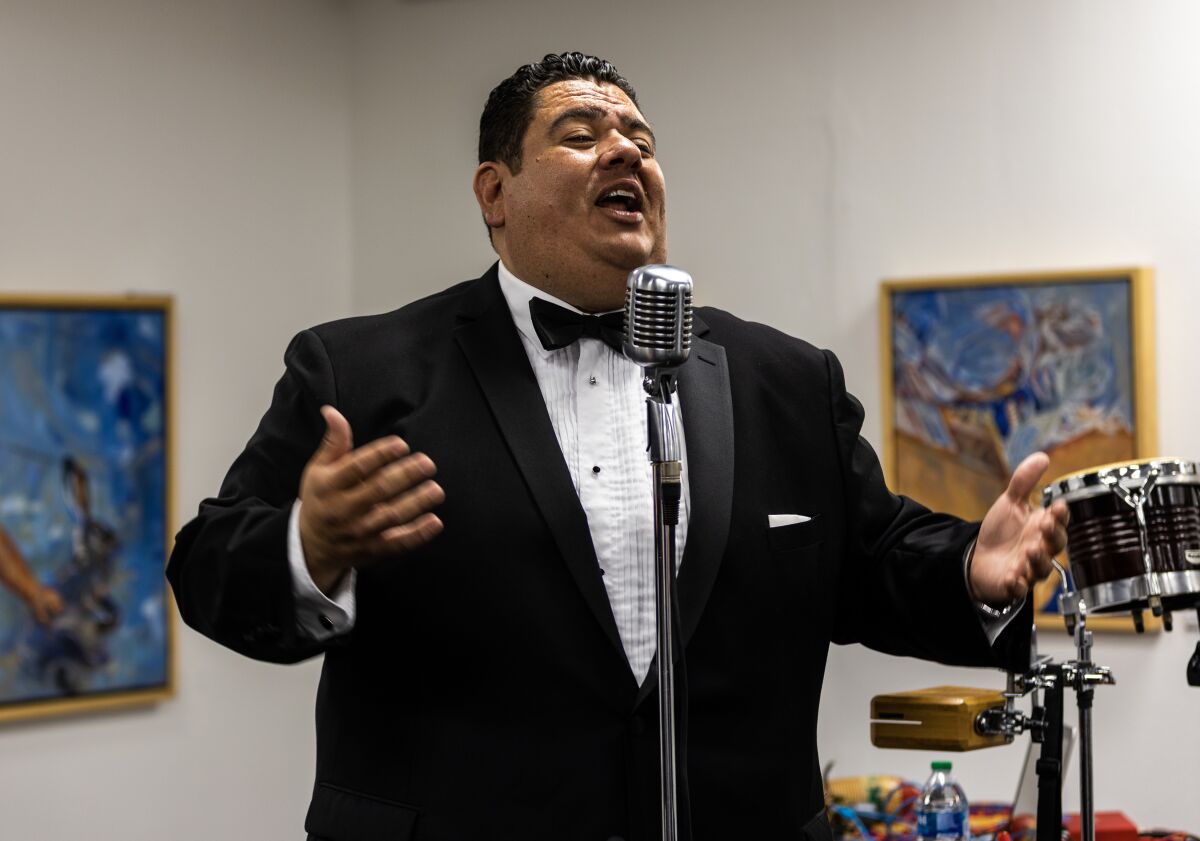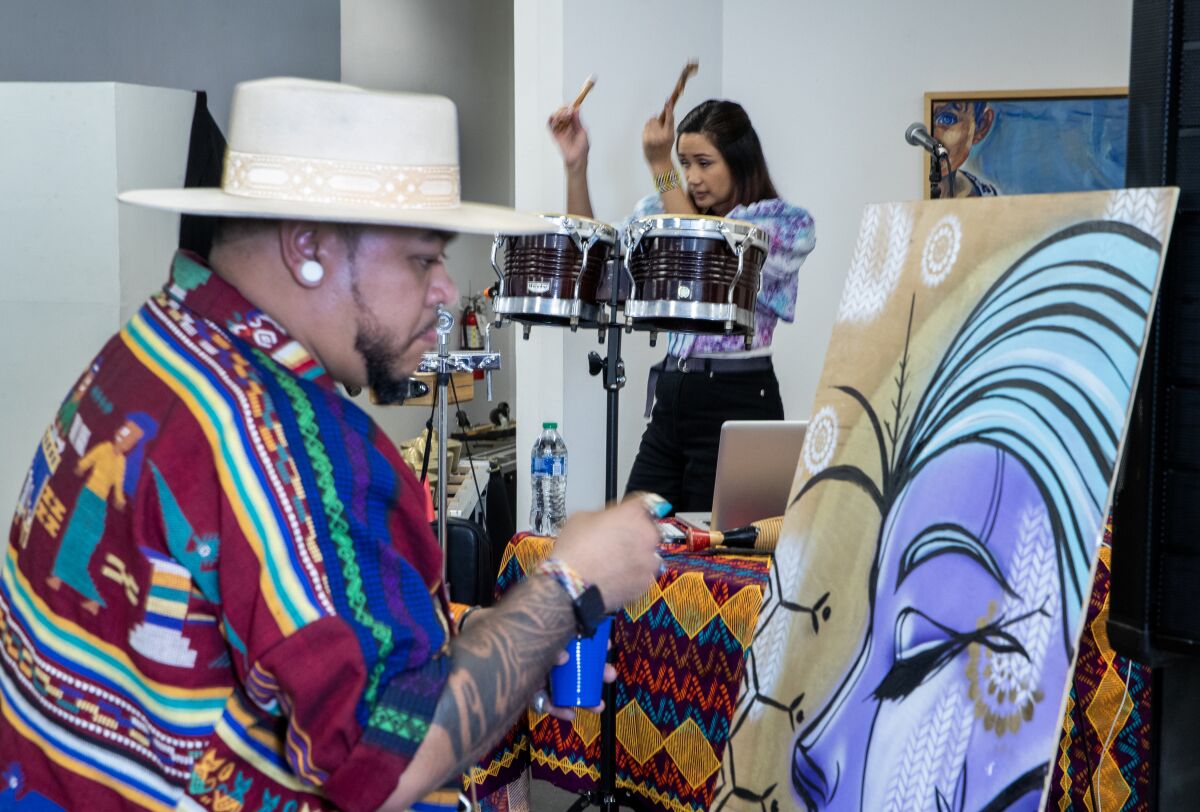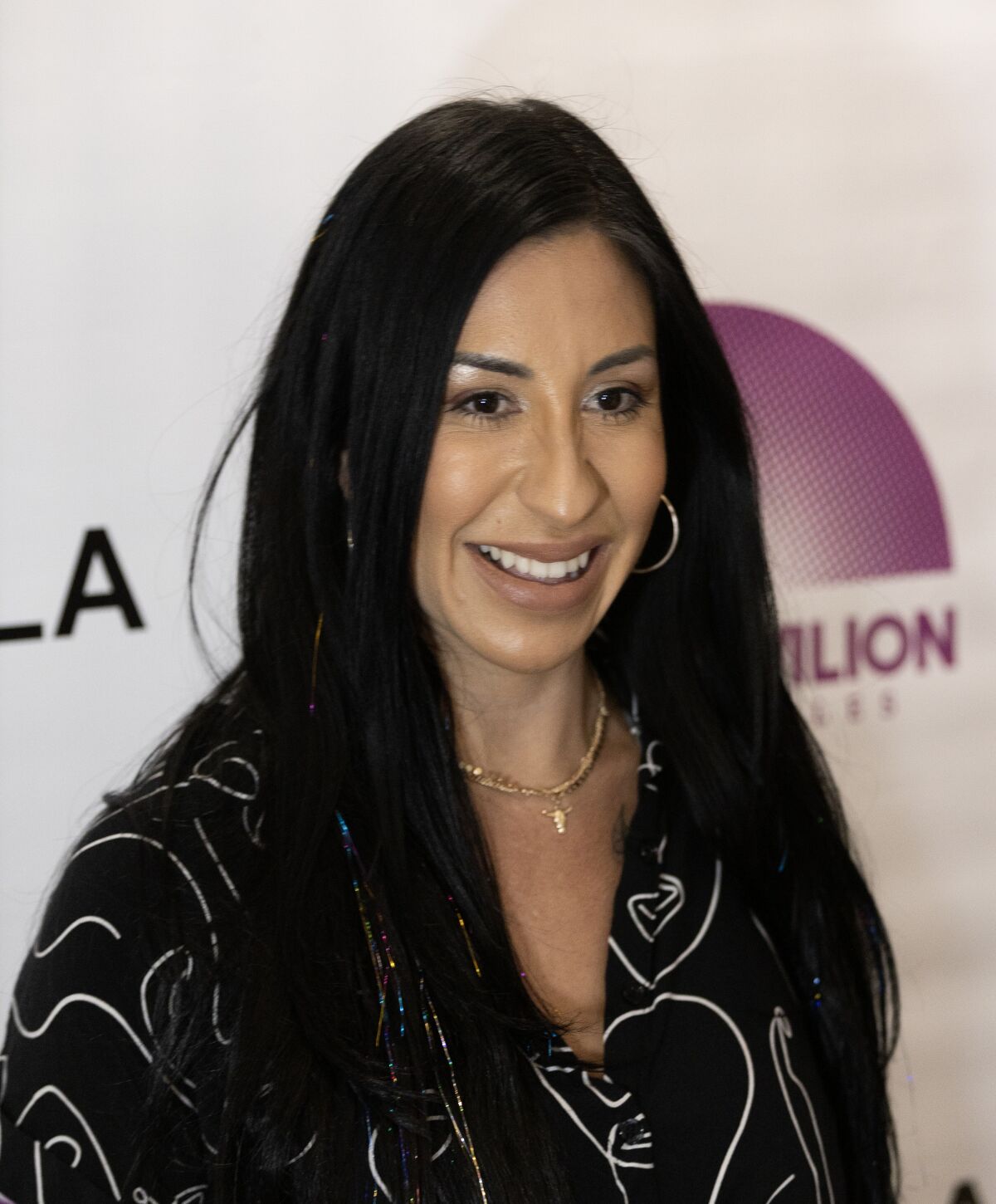A funky quartet was churning out Santana covers at the Mexican Consulate on Tuesday as a crowd of journalists gathered to hear about the upcoming Levitt Pavilion Los Angeles concert series. But that was only the opening act.
Since the early 2000s, free summer concerts at the bandshell on the north side of MacArthur Park have drawn thousands to hear mash-ups of Celtic-Bhangra-reggae, take sonic odysseys through Belize and sub-Saharan Africa, and groove at what feels like a pop-up block party scored to Colombian dance music or a Fela Kuti-Beatles tribute (yes, you read that right).
Allegra Padilla, second from left, executive director of Levitt Pavilion Los Angeles, poses with El Conjunto Nueva Ola during a lineup announcement to promote the Levitt Pavilion Summer Concert Series in MacArthur Park at the Consulate General of Mexico, Los Angeles in Los Angeles on Tuesday.
(Allen J. Schaben / Los Angeles Times)
So after the funk quartet wrapped on Tuesday, Levitt Pavilion L.A. executive director Allegra Padilla and her colleagues unveiled a summer 2023 lineup that will open June 10 with Tijuana techno-ranchera pioneers Nortec Bostich + Fussible; segue to Grammy-awarded hometown heroes La Santa Cecilia on July 23; and sign off Sept. 3 with Beatriz Solis joining the Eisner Intergenerational Big Band from HOLA, from just down the block at Heart of Los Angeles.
Then it was back to more live music inside the Mexican Consulate. Tuxedo’d Julian Torres, looking like a 1940s matinee idol, belted out a note-perfect version of Agustín Lara’s swooning classic, “Granada” (Torres will perform at the Levitt on June 23, with Marco Antonio Godoy and Trio Casablanca). He was followed by Gingee, a native Angeleno, paying tribute to her Filipino roots with a set of percussive soundscapes made up of kulintang gongs, shakers and electronic beats (a preview of her Sept. 2 show with Para Sa Lahat).

Julian Torres sings during a lineup announcement to promote the Levitt Pavilion Summer Concert Series in MacArthur Park at the Consulate General of Mexico, Los Angeles in Los Angeles on Tuesday.
(Allen J. Schaben / Los Angeles Times)
Like practically every arts organization in the world, the Levitt series is trying to rebound from the pandemic and the upheavals of the Late-Trump era, while programming for increasingly varied audiences (ethnically, linguistically, financially). In an interview Padilla said she regards this as “a key moment” for L.A. arts groups, with Snehal Desai taking over as artistic director of Center Theatre Group and other members of a new, diverse group of cultural leaders blowing up the status quo.
Because of its location, and the polyglot audiences it attracts, the Pavilion can continue to play a lead role in this kind of artistic “bridge-building,” she said.
“It’s people who have MacArthur Park as their backyard, and it’s people who love music from far and wide, and sometimes they overlap and sometimes they don’t,” she said of Levitt audiences. “So Levitt L.A. has been very intentional about allocating budget and structuring our organization in a way that still maintains roots in the neighborhood, yet we make sure that we’re bringing world-class music to build intercultural understanding and to put venues on a professional platform. Because it’s important whether people have a lot of money or no money that they still have access to quality.”
Funded by individual donors, government grants, business sponsors and the philanthropic largesse of the late New York custom-shirt baron Mortimer Levitt and his wife, Mimi, the MacArthur Park site is one of several Levitt venues around the country. Its location, in one L.A.’s most polyglot corners, has been a mixed blessing. Gentrification is encroaching on the Westlake-MacArthur Park area, where the median income is under $30,000. Crime remains a concern and, for some, a deterrent.

Gingee, shown at top of frame, performs along with visual artist Dee Jae Pa’Este during a lineup announcement to promote the Levitt Pavilion Summer Concert Series in MacArthur Park at the Consulate General of Mexico, Los Angeles in Los Angeles on Tuesday.
(Allen J. Schaben / Los Angeles Times)
But that hasn’t stopped cultural entities like HOLA from thriving and expanding, or the Goethe Institut from opening a hyper-local Neighborhood Interpretive Center amid the swap meets, beauty parlors and basketball courts.
“MacArthur Park often has a negative perception, and there’s a lot of challenges,” Padilla said. “Yet there’s also so much cultural vibrancy here. It is our job to uplift that. That’s why we work with traditional heritage groups of, like, Guatemalans and people from El Salvador and the Central American diaspora.”
Indeed, as in years past, this summer’s Levitt lineup draws from neighborhood artists as well as international ones. Sometimes those are the same people. Like the Mexican Consulate, which not coincidentally sits directly across 6th Street from the Pavilion, neighborhood artists have a personal stake in MacArthur Park, even if they also tour internationally.

Beatriz Solis poses for the media during a lineup announcement to promote the Levitt Pavilion Summer Concert Series in MacArthur Park at the Consulate General of Mexico, Los Angeles in Los Angeles on Tuesday.
(Allen J. Schaben / Los Angeles Times)
Amandititita, a 4-foot-9 dynamo Mexican cumbia singer-songwriter, and the daughter of musician Rodrigo González (“El profeta del nopal”), who has lived in Los Angeles for 13 years, said that she has “gotten the opportunity to live through the love and the inclusion that’s poured into this community thanks to the consulate.”
“And so it’s so important to give out these stories to the youth and obviously to the community at large,” she said.
The series organizers still have a few weeks to get ready. The bandshell is undergoing repairs, along with the park’s irrigation system. Trees will be trimmed, bathrooms spiffed up.
Beatriz Solis, a pop-ranchera singer who also descends from Mexican musical royalty (Marco Antonio Solis and Beatriz Adriana), praised the Levitt series for being free, family-friendly and genre-agnostic.
“Having this platform, and being able to be open to other diversities of music and of culture, is truly wonderful,” she said.
This story originally appeared on LA Times

